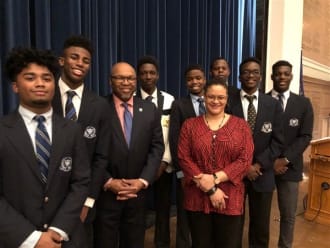
February is Black History Month, and Upper Canada College’s Black History Club honoured it with a series of awareness-raising events.
According to club head Samar Carmack, the club was started four years ago by those “who felt like there should be a safe space for black students to come together to talk about issues that black people face in a predominantly white school.”
Outside of organizing Black History Month events, the club meets every Wednesday to discuss “current issues across North America and things that need to be changed within the school.” Carmack stresses that the club isn’t exclusively for black students.
“The club’s main goal is to discuss injustice within society and discover ways to change it,” he says. “If you feel like coming, then you’re more than welcome to do so.”
A non-profit organization called 100 Strong Foundation was established in 2012 by a group of accomplished, professional black men compelled to change the narrative of young African-Canadian black boys as it exists today, and break the boundaries on views within the community that tend to limit young black men from reaching above and beyond their current circumstances.
Old Boy Kal Shaw ’17 was mentored by 100 Strong co-founder Donald McLeod and connected it with UCC’s Black History Club. From Carmack’s perspective, the foundation “helps young black students learn the skills they’ll need in order to succeed in life, and aims to positively change the image of black people.”
Ray Williams, one of the founders of 100 Strong who serves as its chair of advancement, communications and strategy, visited UCC as part of Black History Month to speak with students. The Black History Club is raising money to support 100 Strong’s mission.
The Black History Club has also invited Knia Singh to address the school on Feb. 28 about his experiences with racism in Toronto.
“He sued the Toronto Police Service for obvious prejudice in carding and won the lawsuit,” says Carmack. “The following Thursday, we’ll have an advising session in Laidlaw Hall where we’ll show a clip from a television show that explores the tensions of the use of the ‘N word.’”
Carmack launched UCC’s Black History Month by speaking to students in Laidlaw Hall about an aspect of the black experience. Here’s an edited version of his speech:
“There is a certain mentality that black people have in order to navigate our way through today’s society. We have been taught to be cautious in certain situations that you have probably never had to think about, such as:
“Whenever someone says the ‘N word,’ a wave of emotions and thoughts crash over us.
“’How do I react. Do I just shrug it off and say it’s cool? But that will leave me feeling frustrated and give them the impression that it’s OK to say it. But if I react aggressively, will I be seen as stereotypical? Even if I calmly react, my message would most likely get lost and that person would become angry and defensive.
“No matter what reaction we decide on, we'll always feel conflicted, reflecting on what just happened and questioning our acceptance in society.
“One thing I will always remember is a conversation I had with my grandma about the police when I was only eight years old. She told me:
“‘If you’re ever pulled over by an officer, immediately put your licence and registration on the dashboard. Make sure your hands are up and that the officer can see them. Never show any signs of aggression, and answer questions calmly. Always say ‘Yes, officer,’ and do whatever he says. I don’t want you to be beaten or killed. They think that you’re dangerous. I don't want you to be another statistic.’
“These are just some of the thoughts that black people live with every day as a result of oppression and prejudice.
“We’re now in February, Black History Month, which was started in 1976 in America by Carter G. Woodson and was officially recognized and established in Canada in 1995. The purpose of this month is to celebrate the culture and beauty of black people, to reflect on the history and struggles of black people, and to look for ways to dismantle prejudice and systemic racism as a whole.
“Today, we look at the great figures who’ve fought against racism and for civil rights, such as Malcolm X, Martin Luther King Jr. and Rosa Parks. But that isn’t enough. Although we as a society have progressed greatly, there’s still more to be done. Solely reminiscing about great black leaders and results from the past won’t change anything today. Black people still face injustice daily.
“I hope that, in this month, all of you reflect on what we as UCC students can do to make the world a better place, and have those deep conversations that make all of us feel uncomfortable. Because that's how change will occur. February shouldn't be the only month that we talk about these issues, but it’s a great time to start.”